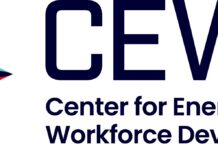PALO ALTO, Calif., Nov. 20, 2019 /PRNewswire-HISPANIC PR WIRE/ — Today is Latina Equal Pay Day—the day that marks how far into 2019 the average Latina would have to work to be paid what the average white man made in 2018 alone. Latinas make on average just 54.5 cents for every dollar a white man makes. That means Latinas have to work nearly twice as long—or twice as hard—to take home the same paycheck. Even when you control for education, years of experience and where they live, Latinas are still paid less than white men for similar work. Without the pay gap, Latinas on average would make over $1 million more over the course of their careers.

New research conducted by LeanIn.Org and SurveyMonkey in partnership with UnidosUS shows that a lack of awareness of this pay gap persists. According to this year’s research, nearly 1 in 3 Americans are not aware of the pay gap between Latinas and white men, and nearly half of Americans don’t know that Latinas, on average, are paid less than white women. The lack of awareness is even higher for people making hiring decisions. Thirty-seven percent of people involved in hiring are not aware that Latinas are paid less than white men. Even when people know the pay gap exists, 59% of them underestimate its size.
To raise awareness of the pay gap for Latinas, actor and activist Eva Longoria—a vocal leader in the push for equal pay for Latinas—has partnered with LeanIn.Org, SurveyMonkey, and UnidosUS to create a powerful video that debunks common misconceptions about the pay gap for Latinas and calls on companies to take steps to pay Latinas, and all women, fairly. The video also calls on individuals to speak up about the need for equal pay, and this year’s research provides evidence that Americans have taken action on this issue, including at the ballot box: 32% of Americans say they have voted for political candidates who take a stand on equal pay.
“Despite disappointing data about a continued lack of awareness of the pay gap for Latinas, many people have taken action in meaningful ways—and perhaps this is a sign of a change in the future,” says SurveyMonkey Research Scientist Erin Pinkus. “People also believe that the pay gap is grounded in prejudice. Specifically, 34% of Americans attribute the pay gap for Latinas to racism, 35% attribute it to sexism, and 31% attribute it to prejudice against immigrants. Acknowledging that prejudice is a major part of the problem means we have the potential to work toward a real solution in the future.”
“Despite entering the workforce in record numbers, representing more than 11 million workers and contributing so much to their families, communities and the national economy, Latinas still bear the brunt of unequal pay, limited access to paid sick time and paid family and medical leave, and discrimination,” said Janet Murguía, President and CEO of UnidosUS. “Latinas know what they need, and their voice is clear on the importance of strong policies that would help close the wage gap. Ending the lack of awareness starts with listening to Latinas and to other women, and supporting policies that reward hard work, expand economic security, and help bolster the national economy,” concluded Murguía.
The Latina pay gap is just one example of how Latinas are disadvantaged in the workplace. Previous research from LeanIn.Org and SurveyMonkey found that Latinas get far less support at work and lack access to opportunity:
- Less access to senior leaders: White men report having access to senior leaders at nearly three times the rate of Latinas (44% vs. 16% have access)—and white women at more than twice the rate of Latinas (35% vs. 16%).
- Less mentorship and sponsorship: Fewer Latinas have had a mentor or sponsor at some point in their career: 21%, compared to 27% of white women and 31% of white men.
- Less access to training: Fewer Latinas have ever received job or executive leadership training in their career: 19%, compared to 30% of white women and 33% of white men.
This lack of access to opportunity is holding Latinas back in the workplace. According to the Women in the Workplace research released by LeanIn.Org and McKinsey & Company earlier this year, Latinas are underrepresented at every level in corporate America. This inequity starts at the first step up to manager, or “the broken rung.” For every 100 men promoted to manager, only 68 Latinas are, and for every 100 men hired into the manager level, only 57 Latinas are. As a result, far too few Latinas become managers, and Latinas can never catch up: fewer than 1% of C-suite leaders are Latinas, despite Latinas making up 9% of the US population.
“Whether it’s the wage gap, the lack of support, or the struggle to get promoted, Latinas face one challenge after another in the workplace. This inequity is fundamentally unfair, and it’s hurting Latinas and their families,” said Rachel Thomas, co-founder and CEO of LeanIn.Org. “If we closed the Latina pay gap, the average Latina would have enough money to pay for three additional years of childcare and two additional years of rent.”
To address obstacles that can contribute to the pay gap and prevent Latinas from advancing, LeanIn.Org recommends these four steps companies can take to address barriers to advancement:
Put processes in place to ensure that employees doing the same work are being paid the same
- Don’t ask job candidates about their current compensation, which is illegal in some states and can perpetuate pay disparities
- Be transparent about the pay ranges for different roles so all employees know what to expect
- Audit compensation data regularly to maintain fairness—and review the data by gender and race to ensure Latinas are being paid fairly
Ensure the performance review process is fair
- Require diverse slates of candidates for promotions
- Set clear performance evaluation criteria before the review process begins—and put safeguards in place to make sure they’re applied consistently
- Track outcomes of promotions by gender and race to make sure Latinas are being treated fairly
Train employees to identify and challenge bias
- Lean In’s 50 Ways to Fight Bias program highlights 50 specific examples of workplace bias and offers research-backed recommendations for what to do (available at no cost)
Double down on mentorship, sponsorship, and leadership training
- Ensure formal mentorship and sponsorship programs are opening doors for Latinas
- Encourage informal interactions between Latinas and more senior colleagues—these types of personal connections can be more effective than formal programs and propel careers
- Track participation in leadership training by gender and race to make sure Latinas are fairly represented
Visitors can find more information at leanin.org/latinaequalpay or by visiting the SurveyMonkey blog.
About LeanIn.Org
An initiative of the Sheryl Sandberg & Dave Goldberg Family Foundation, LeanIn.Org works to help women achieve their ambitions and create a more equal world. LeanIn.Org offers inspiration and support through an online community, free education materials, and Lean In Circles, small groups of peers who meet regularly to learn and grow together. The Lean In community includes more than two million women and men and 45,000 Lean In Circles in 174 countries. The Sheryl Sandberg & Dave Goldberg Family Foundation, which also runs OptionB.Org, is a private operating nonprofit organization under IRS section 501(c)(3).
About SurveyMonkey
SurveyMonkey is a leading global survey software company on a mission to power the curious. The company’s People Powered Data platform empowers over 17 million active users to measure and understand feedback from employees, customers, website and app users, and the market. SurveyMonkey’s products, enterprise solutions and integrations enable 335,000+ organizations to solve daily challenges, from delivering better customer experiences to increasing employee retention. With SurveyMonkey, organizations around the world can transform feedback into business intelligence that drives growth and innovation.
About UnidosUS
UnidosUS, previously known as NCLR (National Council of La Raza), is the nation’s largest Hispanic civil rights and advocacy organization. Through its unique combination of expert research, advocacy, programs, and an Affiliate Network of nearly 300 community-based organizations across the United States and Puerto Rico, UnidosUS simultaneously challenges the social, economic, and political barriers that affect Latinos at the national and local levels. For more than 50 years, UnidosUS has united communities and different groups seeking common ground through collaboration, and that share a desire to make our country stronger. For more information on UnidosUS, visit www.unidosus.org or follow us on Facebook, Instagram, and Twitter.
Media Contact
[email protected]


Logo – https://mma.prnewswire.com/media/888861/LI_Logo.jpg
Logo – https://mma.prnewswire.com/media/1032549/SurveyMonkey.jpg
Logo – https://mma.prnewswire.com/media/1032550/UnidosUS.jpg
SOURCE LeanIn.Org







